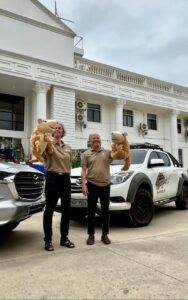I could barely remember the last time I drove a Mazda pick-up. That was over 10 years ago, when the Inquirer outdoor and outreach group, of which I was a member, went to Tinglayan in Kalinga Province (around 450 km north of Manila). We were on board three pick-ups, one of which was a Mazda BT-50, bringing used computers, educational materials, and vegan advocacy literature to students of Luplupa Elementary School.
Two days ago I was with fellow members of the local motoring media in Palawan Province, around an hour’s flight south of Manila. We were with a team from Mazda Philippines en route to the municipality of Roxas. We were to witness Mazda Philippines turning over to Katala Foundation, Inc. (KFI) a brand new Mazda BT-50 Pangolin Edition II pick-up.
KFI is a non-government conservation group that documents and protects the provinces’ critically endangered endemic wildlife species, particularly the Philippine Cockatoo, Palawan Forest Turtle, Calamian Deer, Balabac Mouse-deer, and the Palawan Pangolin, which the natives call the “balintong.” KFI has been in partnership with Mazda Philippines for some years already. In fact, the foundation already received from the carmaker a BT-50 Pangolin Edition I in late December 2020 for its field operations. Now, the Mazda BT-50 Pangolin Edition 2 has a stable and sturdy 3.0L AT 4×4 that comes in handy for navigating deep into forests, going up and down mountains, and crossing rivers.
KFI’s jovial co-founder and director, German biologist Dr. Sabine Schoppe, has dedicated the last three decades helping save and conserve wildlife in the province. She’s also the director of the Palawan Pangolin Conservation Program.
When she first arrived in the Philippines in 1995, she focused on fish sanctuaries and introduced alternative livelihoods to communities. After four years, she became a guest professor at Western Philippines University in Palawan for the next six years. She has stayed in the province since, helping establish the KFI in August 2002.
“My heart became talagang Filipino. Ang heart ko talagang Palawena,” she told me when I asked her why she stayed on.
Mazda Philippines president and CEO Steven Tan, who was with us during the trip, is a Malaysian based in the Philippines for the past 12 years. He came across KFI and its work “mostly by accident,” he said, because he read a story about KFI using an old Mazda SUV.
“I said, ‘We should support the effort, right?’ and then I learned more about the Pangolin. To my surprise, I found that people didn’t know what a Pangolin was. The Pangolin doesn’t have a natural predator, except for humans, who harvest these animals by the thousands for overseas demand,” Tan explained.
Earlier, Schoppe told the media that the Pangolin’s natural defense mechanism of curling up when it senses natural predators no longer works with humans who hunt them for their scales and meat. In fact, curling up makes it easier for poachers to gather them.

Schoppe, Tan, and the rest of the KFI and Mazda Philippines entourage were at the Roxas town hall on Friday to officially kick-off the 4th Roxas Pangolin Day, as part of the World Pangolin Day, which is observed every third Saturday of February.
Roxas Mayor Dennis M. Sabando was on hand to welcome the group. He also said in his speech that the Roxas community had a big responsibility to care for the balintong, and help them thrive as a species.
“Balintong are natural pest controllers. It’s not only the Pangolin that we are protecting but our plantation of cashew as well, which has made Roxas the cashew capital of the Philippines,” Sabando said.
Schoppe then told the crowd that Roxas adopted the Palawan Pangolin as its flagship species in November 2020 in order to save it from extinction.
“We are starting to see pangolins again in Roxas. But it’s still too early to tell. We need the support of every barangay, every community, every individual. We need to stop collecting, eating, buying and selling pangolins, if we want them to still be part of the environment. If we lose the Pangolin, insect pests will take over and this will affect plantations and housings,” Schoppe implored.
In his speech, Tan described Schoppe as “best friends” with Pangolins.
“Dr. Sabine will always inspire you with her passion, and passion can change the world,” Tan said.
He added, “Business does not only exist to make money. There are other things that a business should do, including providing employment, and the bigger picture is to contribute to a better environment. I would say that Pangolin conservation is one of Mazda Philippines’ environment projects that is closest to my heart. We named our pick-up the BT-50 Pangolin specifically for raising awareness. If somebody sees a BT-50 Pangolin Edition truck and the Pangolin graphic, they will look it up and find out more. We would have done our part in raising awareness.”
By the end of the day, I was wondering to myself, why does it have to take foreigners—in this case a German and a Malaysian—to make us aware of our own problems, as well as realize our own potentials? That’s another topic worthy of a future discussion in this space.
MAIN PHOTO: Mayor Dennis Sabando, Dr. Sabine Schoppe, Steven Tan and Mazda Philippines executives Ronette Tanjuatco and Saul Babas during the signing of the Memorandum of Agreement./Ron delos Reyes









